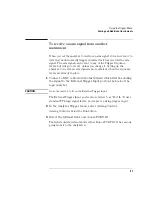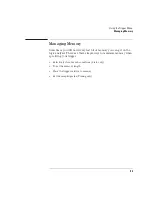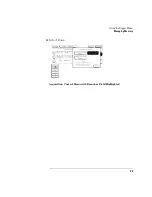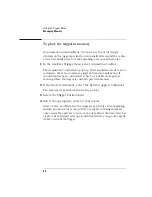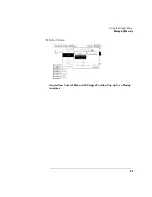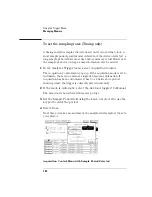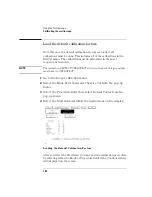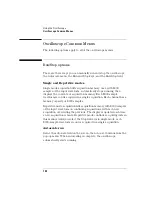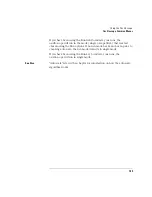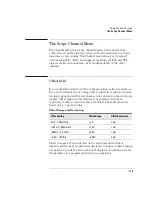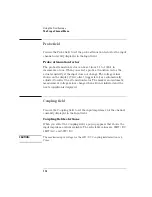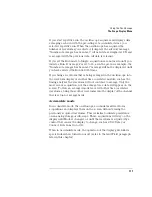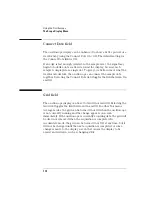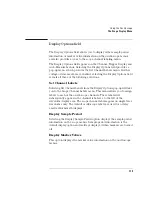
105
Using the Oscilloscope
Calibrating the oscilloscope
Self Cal menu calibrations
Messages will be displayed as each calibration routine is completed to
indicate calibration has passed or failed. The resulting calibration
factors are automatically stored to nonvolatile RAM at the conclusion
of each calibration routine.
The Self Cal menu lets you optimize vertical sensitivity (Vert Cal) for
channels 1 and 2 individually or both channels on a board
simultaneously. Also, the Self Cal menu lets you optimize delay (Delay)
for channel 1 and 2 separately, then Time Null for channel 2 and the
Logic Trigger.
1
Optimize Vert Cal of the Self Cal.
a
Connect two BNC 50-W, 9-inch cables to the BNC tee adapter.
Connect the BNC 50W (f)(f) adapter to the BNC tee adapter,
and connect the 48-inch BNC cable to the BNC 50W (f)(f)
adapter. Once you select Start, the instrument will prompt
you to connect the cables to the appropriate locations on the
rear panel of the instrument.
b
Select the Mode field, then select Self Cal from the pop-up
menu.
c
Select the Procedure field, then select Vert Cal from the pop-
up menu.
d
Select the Channel field, then select a channel choice from the
pop-up menu.
e
Select the Start field and follow the instructions on the
display.
f
After completion of Vertical Calibration, remove the cables
from the instrument.
Summary of Contents for 1670E Series
Page 6: ...6 In This Book...
Page 26: ...26 Contents...
Page 27: ...27 Section 1 Logic Analyzer...
Page 28: ...28...
Page 29: ...29 1 Logic Analyzer Overview...
Page 39: ...39 2 Connecting Peripherals...
Page 49: ...49 3 Using the Logic Analyzer...
Page 72: ...72 Using the Logic Analyzer The Inverse Assembler...
Page 73: ...73 4 Using the Trigger Menu...
Page 101: ...101 5 Using the Oscilloscope...
Page 151: ...151 6 Using the Pattern Generator...
Page 199: ...199 7 Triggering Examples...
Page 237: ...237 8 File Management...
Page 249: ...249 9 Logic Analyzer Reference...
Page 360: ...360 Logic Analyzer Reference The Compare Menu...
Page 361: ...361 10 System Performance Analysis SPA Software...
Page 397: ...397 11 Logic Analyzer Concepts...
Page 430: ...430 Logic Analyzer Concepts The Analyzer Hardware Oscilloscope board theory Oscilloscope board...
Page 439: ...439 12 Troubleshooting the Logic Analyzer...
Page 455: ...455 13 Specifications...
Page 471: ...471 14 Operator s Service...
Page 479: ...479 Operator s Service Troubleshooting Troubleshooting Flowchart 2...
Page 491: ...491 Section 2 LAN...
Page 492: ...492...
Page 493: ...493 15 Introducing the LAN Interface...
Page 497: ...497 16 Connecting and Configuring the LAN...
Page 506: ...506 Connecting and Configuring the LAN Connecting and Configuring the LAN...
Page 507: ...507 17 Accessing the Logic Analyzer File System Using the LAN...
Page 515: ...515 18 Using the LAN s X Window Interface...
Page 527: ...527 19 Retrieving and Restoring Data Using the LAN...
Page 539: ...539 20 Programming the Logic Analyzer Using the LAN...
Page 546: ...546 Programming the Logic Analyzer Using the LAN Programming the Logic Analyzer Using the LAN...
Page 547: ...547 21 LAN Concepts...
Page 555: ...555 22 Troubleshooting the LAN Connection...
Page 580: ...580 Troubleshooting the LAN Connection Getting Service Support...
Page 581: ...581 Section 3 Symbol Utility...
Page 582: ...582...
Page 583: ...583 23 Symbol Utility Introduction...
Page 588: ...588 Symbol Utility Introduction Symbol Utility Introduction...
Page 589: ...589 24 Getting Started with the Symbol Utility...
Page 597: ...597 25 Using the Symbol Utility...
Page 609: ...609 26 Symbol Utility Features and Functions...

